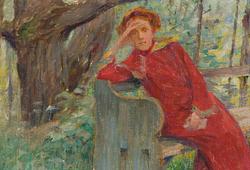Oskar Bergman
Grove in Fiesole, Italy
Signed Oskar Bergman and dated Fiesole 1913. Watercolour, image area 22 x 30 cm.
Provenance
Bukowski Auktioner, Internationella Vårauktionen 508, 27 - 29 May 1998, lot 16.
More information
Oskar Bergman grew up under modest circumstances on Östermalm in Stockholm and initially earned his living as a messenger boy. Eventually, he was able to attend the Technical School, and in the evenings, he took drawing lessons from Anders Forsberg. During his free time, he visited the National Museum, where he became particularly fascinated by the Romantic landscape painters, such as Marcus Larsson and Edvard Bergh, and he soon realised that his own strength lay in the detailed depiction of nature. Bergman's art, as it appeared at the beginning of his career, stood in stark contrast to the Matisse students who had recently returned from Paris, but he was convinced that his art would prevail in the long run. Time proved him right, but it would take until the mid-1940s before he achieved his breakthrough with the general public.
Bergman's art is characterised by a richly detailed and atmospheric landscape painting, often featuring motifs drawn from the Swedish countryside. In the painting currently up for auction, we see him applying his distinctive style to the Italian landscape in Fiesole. He creates a stylised mystique of the Italian grove, inspired by the aesthetics of Japanese woodblock prints. Japonisme was a cultural movement that spread across Europe during the second half of the 19th century, prompted by Japan's opening of its borders to the outside world in 1854. Japanese objects made their way to the West, sparking a strong interest in the country's culture. Swedish artists who were in France in the 1880s came into contact with Japanese visual art (including woodblock prints), and this left clear traces in their work. Among these artists was the national painter Carl Larsson, who wrote in 1919, "as an artist, Japan is my homeland."
Artist
Oskar Bergman was a Swedish visual artist born in Stockholm. Bergman was self-taught and took much inspiration from his study trips to Germany, Italy and France. Bergman worked as an etcher and painter, with his paintings, which emulate an overpowering Swedishness, is valued today not only in Sweden, but also international artists. With his razor-sharp and lifelike depictions of both city scapes and rural landscapes, Bergman managed to capture viewers and art audiences alike. As a self-taught artist, one is particularly impressed by his detailed and evocative painting style.
Read more






































